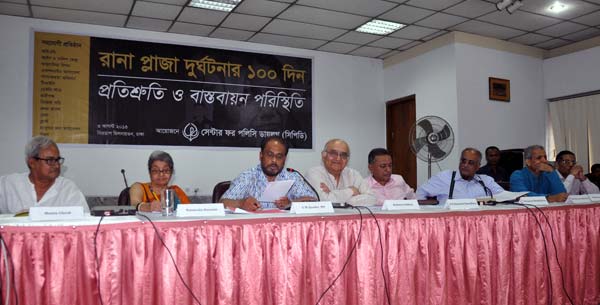Recovering from Rana Plaza Tragedy:
Recommendations at hand, awaiting implementation
The Centre for Policy Dialogue (CPD) has presented the first monitoring report on the Rana Plaza garment mishap at a dialogue titled “100 Days of Rana Plaza Tragedy: A Report on Commitments and Delivery” on Saturday, 3 August, at the CIRDAP Auditorium, Dhaka.

The dialogue is a part of an initiative taken by CPD, in partnership with a number of concerned civil society organisations* and individuals, to independently monitor the Rana Plaza tragedy. The monitoring includes an audit of what is being done since the incident and accordingly mounting pressure on key stakeholders so that appropriate and adequate actions are taken.
Mr G M Quader, MP, Minister for Commerce graced the event as the Chief Guest and Mr Amir Khosru Mahmud Chowdhury, Former Minister for Commerce, attended as the Special Guest.
Invaluable recommendations surfaced towards consolidating the efforts from various parts of the society to immediately address the unfulfilled needs of the affected in the Rana Plaza tragedy. Members of Parliament, civil society organisations, representatives from business chambers and trade unions, human rights organisations and legal forums, NGOs and media took part in the discussion.
Several victims of the Rana Plaza tragedy shared their plight at the dialogue, particularly noting the issue of inadequate compensation even after three months of the incident that occurred in April this year.
Professor Mustafizur Rahman, Executive Director, CPD reiterated the necessity of such monitoring because despite having recommendations following past RMG industry disasters, promises towards compensation and making the factories safe and secure faded away.
The dialogue also spurred debate as to the debacles in the way to implementing planned industrialisation, labour law and legal measures and bringing the responsible behind RMG disasters to justice.
The civil society members emphasised trade unionism and depoliticising trade unions to ensure workers’ rights and identified lack of good governance as one of the prime factors behind the tragedy. Dr Debapriya Bhattacharya, Distinguished Fellow, CPD also requested the government and other stakeholders to make available all follow-up and monitoring reports undertaken since the tragedy.
Voices were raised that the issue of compensation must be hastened in view of moral obligation instead of tacking it through legal measures, which would delay the workers’ fair treatment and rehabilitation. The Prime Minister’s Office was urged for a transparent account of the aid received on behalf of the victims.
Other recommendations included forming a central task force or central monitoring committee by combining the government, civil society organisations and human rights organisations for close and unbiased monitoring of the tragedy; and ascertaining the exact number of the affected, missing, and deceased workers.
Representatives from trade union bodies called for arranging treatment, compensation and alternative livelihood for the victims, and in the long term, settling the right wages.
As regards long-term measures, notable recommendations included: maintaining detailed database of future workers; provision of insurance, provident and development fund; addressing unplanned industrialisation and sealing off faulty factories for averting future disasters; implementing labour law and taking tougher action against politically sheltered RMG owners who are responsible for such mishaps; and the political parties’ responsibility to address the recommendations in their election manifesto.
*The partnering organisations of this initiative are the Institute of Architects Bangladesh, Ain o Salish Kendra, Dhaka Ahsania Mission, ActionAid Bangladesh, Campaign for Popular Education, Transparency International Bangladesh, The Daily Star, Naripokkho, Nijera Kori, the Prothom Alo, Bangladesh Environmental Lawyers Association, Bangladesh Legal Aid and Services Trust, Manusher Jonno Foundation and Sushashoner Jonno Nagorik.
Presentation on the first monitoring report by Dr Khondkar Golam Moazzem, Additional Research Director
Introductory remarks by Professor Mustafizur Rahman, Executive Director, CPD
Remarks by Professor Rehman Sobhan, Chairman, CPD
Keynote presentation by Dr Khondaker Golam Moazzem, Additional Research Director, CPD
A section of print media and online reports on the dialogue:
The Daily Star [2] Star Business
Prothom Alo Business
Dhaka Tribune [2]
Banik Barta
New Age
Daily Sun
The New Nation
Naya Diganta
Bangladesh Protidin
Arthoneeti Protidin
Fibre and Fashion [India]
The Bangladesh Chronicle



